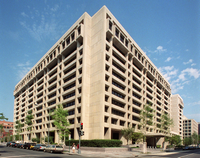For the IMF, the global economic downturn could not have come soon enough. Two years ago, the Fund's lending portfolio was a scanty $13 billion, down from $100 billion in 2003. As Argentina, Brazil, Uruguay, Indonesia, and the Philippines each paid off their loans early, the institution's revenue stream slowed to a trickle. Since the institution's operating costs are financed by fees and interest charged on its loans, its shrinking portfolio resulted in annual losses between $200 and $300 million. Forced to find alternative sources of income and reduce costs, the fund initiated plans to sell off some of its gold assets and announced it would be cutting staff by as much as 15 percent. What a difference an economic crisis makes. As American and European credit markets froze up this fall, investors in need of cash began pulling their money out of emerging markets, essentially outsourcing the liquidity crisis. The result? Once again, the IMF has a mission, and it has not hesitated to act upon it. To date, the fund has committed about $50 billion in loans to an array of economies adversely affected by the crisis, including Belarus, Hungary, Iceland, Latvia, Pakistan, Serbia, and Ukraine. A precautionary loan is in place for El Salvador and negotiations are under way with Turkey. An institution that just recently faced a "crisis of identity" today finds itself more essential than ever before.
IMF: Brother, Can You Spare a Billion?

